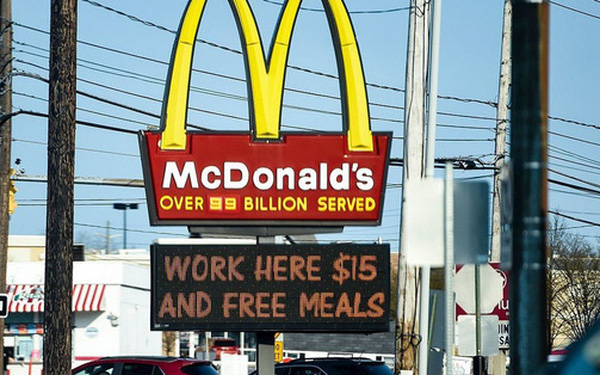Paradox in the US: There are still millions of people unemployed, but companies can’t hire employees
- Tram Ho
The Covid-19 pandemic has led us to a lot of strange economic outcomes. The most recent is the growing complaints in the US about the shortage of workers, despite the fact that compared to the time before the epidemic, there are still more than 8 million people without work.
In early April, Bloomberg reported that Delta Air Lines had to cancel 100 flights because of a shortage of staff. A coffee shop in Florida is so hard to find people that it has turned to robots to greet customers and deliver drinks. A McDonald’s restaurant pays $50 just for the job of flipping burgers to attend an interview.

The total number of vacancies in the US is at its highest level in at least two decades. Historical data shows that job fairs are hiring fewer workers than ever before. And even after accounting for changes in the structure of the workforce, wage growth is currently around 3% – a pretty high level and shows that companies are still offering attractive salaries to attract. workers.
If this situation persists, it will eventually cause inflation and threaten the recovery of the economy. There are three possible explanations for this phenomenon: generous subsidies, fearful workers, and a redistribution of labor across industries.
Let’s start with the massive fiscal stimulus packages of the US government. Most recently, this past spring, every American was given $1,400 in cash. Many people, after receiving a generous allowance, quit their jobs to … sit and play. Currently unemployment benefits are 300 USD/week, making about 40% of unemployed people who would rather stay at home receive benefits and earn more money than their previous job.
Many studies have shown that the more generous the allowance, the less likely workers are to look for a new job. During the pandemic that link seems to have weakened. Realizing that unemployment benefits only increase in the short term, workers will not want to turn down a job that brings many benefits in the long run. At the beginning of the epidemic, unemployment benefits even increased to $ 600, but this policy ended in the summer and did not have much impact on the labor market (according to a study by the University of Massachusetts-Amherst).
This leads to the inference that the second factor – fear – may better explain America’s labor shortage. Nearly 4 million people are not looking for work “for fear of getting sick,” according to official figures. This explanation is also reasonable if looking at the most serious labor shortage industries, which are healthcare, entertainment and restaurant – hotel services, accommodation facilities. These are all industries that require employees to come into direct contact with many people, leading to a higher risk of infection.
In contrast, labor shortages are not severe for industries that can still operate with social distancing measures or outdoor activities.
The last reason is that the reallocation of resources in the economy is taking place very strongly. Some industries are growing in popularity while others are in decline, reflecting changing consumer needs.
After studying more than 400 geographical areas, The Economist concludes that geographical factors also have a significant impact. The gap in job growth between the most developed regions and those facing difficulties has doubled compared to before the epidemic. Workers need time to adapt to this. For example, a bartender looking for a job in midtown Manhattan will take longer to find a job than a delivery driver in Westchester.
As vaccines continue to reduce hospitalizations and deaths from Covid-19 and prove effective in preventing the disease from spreading, workers’ fears will also decrease. However, if the labor shortage disappears and the risk of inflation is extinguished, many unemployed workers will have to enter fields that are completely new to them if they do not want to be unemployed forever.
Source : Genk
